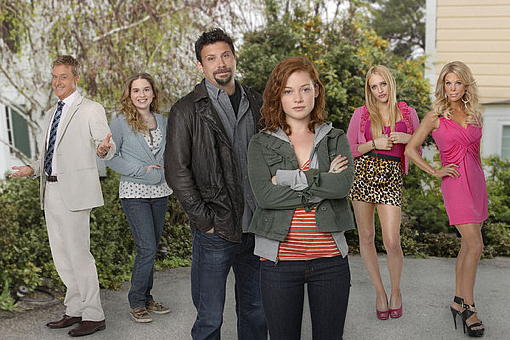By Scott Root · August 15, 2011

Can a TV show be “rife” with stagnation? Somehow, this remains the only words to describe Suburgatory, starring Jane Levy as, Tessa, the droll city-slicker daughter of George (Jeremy Sisto). After finding a box of condoms in his Tessa’s room, George packs her up and moves from the city (Queens, or maybe Brooklyn) to the “suburbs.” Naturally and predictably, Tessa plays the tortured teen outsider forced into an old-fashioned and tired fish-out-of-water story.
Ultimately, the premise of the story feels forced. Though most people regard the suburbs as safe, common sense dictates that your odds of protecting your daughter from sex increase exponentially by sealing her in a convent, but only marginally (if at all) from moving to the suburbs. In fact, if George had ever seen 16 and Pregnant, he might not be so quick to run from the city. Nonetheless, somehow this first reaction brings the father-daughter duo into what the show’s creators describe as the world of The Stepford Wives. This rings a foul note, however, as The Stepford Wives actually captures the horror of living in a cookie cutter world — Suburgatory does not.
From a strictly theological perspective, the title of the show dooms the premise. Purgatory is a piece of Catholic dogma for those who lived a piteous life but weren’t quite pure to burn away their sins and be purified before ascending into heaven. It’s one of the most optimistic elements of the Catholic afterlife scenario, a spiritual summer school of sorts. However, the creators of Suburgatory clearly missed this facet of their confirmation classes. Although purgatory has become nearly synonymous in popular culture with the common notion of hell, the actual theological definition holds more interesting possibilities to be explored. Especially in the context of the magnitude of “sin” committed by Tessa. American popular culture has entered an age of hedonism where sex is the norm rather than a puritanical sin. Jenji Kohan has already tackled the suburbs as hell paradigm in Weeds. Imagining that the suburbs were some kind of living purgatory where there was a light at the end of the tunnel held the key to taking this series out of the realm of normal broadcast TV.
Instead, it has somehow become the epitome of everything wrong with TV today. The show does not explore how the suburbs might not be some kind of eternal torment, rather it chooses to place Tessa into some kind of eternal funk about being an outsider. Fine. Don’t take the high road; let’s ignore the egregious use of a powerful symbol for the pathetic pun purgatory portmanteau. Even giving the show leeway to throw away their most valuable literary device, it still falls short. The weak set-up forces Tessa to whine about being stuck in the styx (I can play the pun game too.) This forces the main conflict of the story to be her rejection of all things suburban: the people, the food, the malls. By the end of the pilot episode, she has already accepted her fate and said almost verbatim “Well garsh, this ‘taint so bad.”
It’s at this point that whole show has been thrown out the window far too early, like a baby with the bath water from the empty nest of the proverbial mixed metaphor. A hint to all would-be show-runners out there. If you have resolved the main conflict of your series (even in something which promises to be an episodic comedy) in the first episode, you have either thrown out every useable plot line, or you must have your main character say “Garsh, I was so wrong with that last thing I said.” The latter makes your writing look incompetent and kills any residual sympathy we had for your characters. The former just kills your show. This isn’t Sophie’s Choice; you can actually choose neither of these possibilities. For example, if I Love Lucy began with Ricky simply accepting that Lucy was probably mentally unstable and committing her in the first episode as he should have done, we wouldn’t be laughing all of these years later when she knocks the wind out of herself stomping grapes (Or did I see that one on the internet?).
The key marker of a TV show that will last is an irreconcilable conflict. Something which the characters can’t fix in episode 1 and something they can’t fix in episode 100. Somehow, Suburagatory has managed to utterly destroy any hope of becoming a lasting TV icon. There’s a sliver of hope that Jeremy Sisto’s performance will pull it out of TV purgatory, but don’t hold your breath.